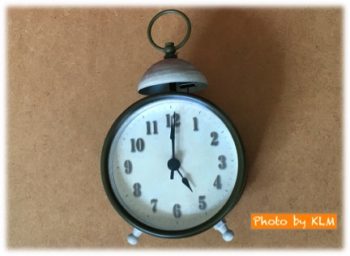Daily Routine and Time: This Is My Day in Korean. Posted by Kyung-Hwa on Nov 22, 2017 in Grammar, Korean Language, Vocabulary
The last two posts included a list of verbs regarding your daily routine, and how to conjugate those verbs. This post will teach you how to describe your daily routines and when they take place in a present tense polite form, ‘-요’ style.
ex)
- 저는 6시 30분에 일어나요. (I wake up at 6:30.) 7시에 커피를 마셔요. (I drink coffee at 7:00.) 8시에 회사에 가요. (I go to work at 8:00.) 9시부터 5시까지 일해요. (I work from 9:00 to 5:00) 12시 45분에 점심을 먹어요. (I eat lunch at 12:45.) 5시 15분에 한국어를 공부해요. (I study Korean at 5:15.) 7시에 저녁을 먹어요. (I eat dinner at 7:00.) 8시부터 10시까지 텔레비젼을 봐요. (I watch TV from 8:00 to 10:00.) 10시 25분에 자요. (I go to sleep at 10:25.)

• 저는
- 저 (Polite form of I)
- –는 is a topic marker. This is used to introduce a topic or contrast/compare with someone or something in a sentence. You add “는” after a Noun ending in a V You can read this post, “What Is a Topic Marking Particle?” to learn more about topic markers in Korean.
* The subject is often omitted in Korean.
• – 에
- –에 : It is a marker that is used after a word/number that indicate time when things happen.
- ex) 6시 30분에 (at 6:30)
• From “Telling Time in Korean: What Time Is It Now?”
- 6시 30분 (여섯 시 삼십 분 – 6:30)
- 12시 45분 (열두 시 사십오 분 – 12:45)
- 5시 (다섯 시 – 5:00)
- 5시 15분 (다섯 시 십오 분 – 5:15)
- 7시 (일곱 시 – 7:00 )
- 9시 (아홉 시 – 9:00)
- 10시 25분 (열 시 이십오 분 – 10:25 )
• From “Korean Verbs and Your Routine #1 & # 2”
- 일어나요 (to wake up)
- 마셔요 (to drink)
- 가요 ( to go)
- 일해요 (to work)
- 먹어요 (to eat)
- 공부해요 (to study)
- 봐요 (to look)
- 자요 (to sleep)
• –을 & –를 : object markers in the Korean language.
- – 을 : When a noun ends in a consonant: noun + 을
- ex) 저녁을 : 저녁 (dinner) +을:
- – 를 : When a noun ends in a vowel: noun +를
- ex) 커피를:커피 (coffee) + 를
• ~부터 ~까지
24. ~부터 ~까지: This means ‘from~ to~’ in Korean. Please remember they come after Korean words that indicate time not before as in English.
25. ex) 8시부터 10시까지 (from 8:00 to 10:00)
• 언제
26. 언제: If you would like to ask about someone else’s habit or daily routine, you can use this Korean word ‘언제 ’ which means ‘when’ in Korean, so you can use 언제 to ask a question about an unspecified time of the day.

I hope this post will help you to describe your day or in having a conversation about routines in Korean with people around you.
감사합니다! (Thank you!)

Build vocabulary, practice pronunciation, and more with Transparent Language Online. Available anytime, anywhere, on any device.



